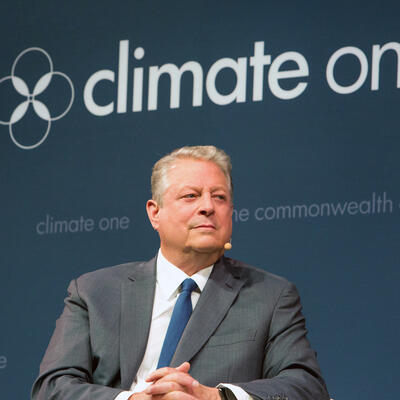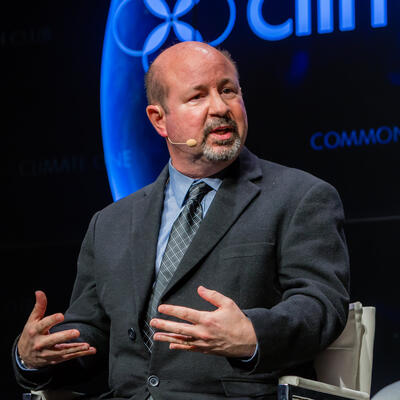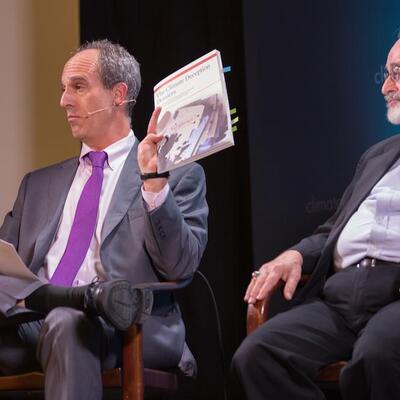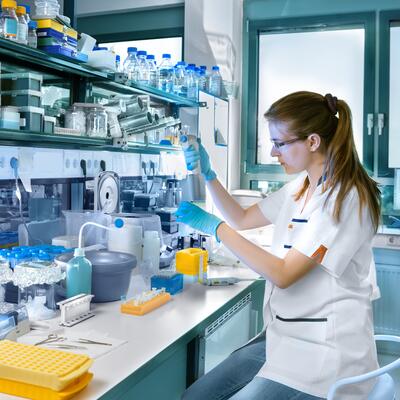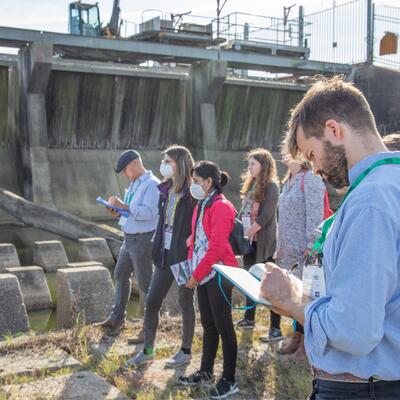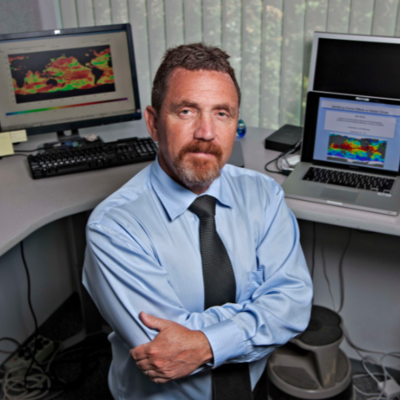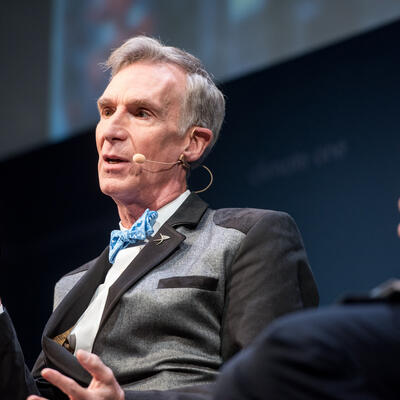
Bill Nye: Science Guy
Guests
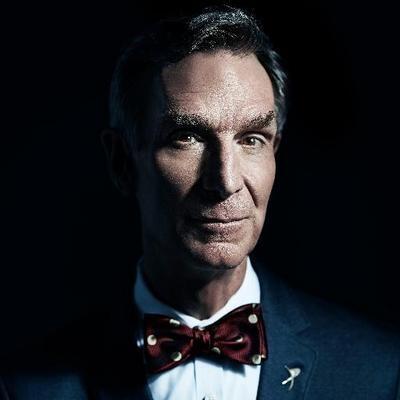
Bill Nye
Jason Sussberg
Summary
Sifting through the Trump administration’s misleading statements on climate change can be a daunting task. That’s where scientist Bill Nye comes in. The Science Guy is on a quest to set the record straight when it comes to anti-scientific thinking and climate denial.
Bill Nye, Television Host, Science Educator
Jason Sussberg, Filmmaker, Bill Nye: Science Guy
This program was recorded in front of a live audience at the Marines' Memorial Theater in San Francisco, CA on November 6, 2017.
Full Transcript
Announcer: This is Climate One, changing the conversation about energy, economy and the environment.
As the Science Guy, television’s Bill Nye inspired a generation of children to love science as much as he does.
Female Speaker: A lot of people of my generation attribute their love and interest in science to Bill Nye.
Announcer: But these days, he’s speaking to a new audience.
Bill Nye: Nowadays I’m talking to adults, and I’m not mincing words. The climate is changing, it’s our fault, and we’ve gotta get to work on this.
Announcer: But Bill Nye doesn’t think we should leave it at that.
Bill Nye: There's three things we want for everybody in the world. We want clean water, renewably produced reliable electricity, and access to the Internet. With those three things we could, I believe, provide a high-quality life for everyone on earth.
Announcer: Bill Nye, the Science Guy. Up next on Climate One.
Announcer: Welcome to Climate One – changing the conversation about America’s energy, economy and environment. Climate One conversations – with oil companies and environmentalists, Republicans and Democrats – are recorded before a live audience and hosted by Greg Dalton.
Got climate deniers? Who ya gonna call?
[SOT: America’s favorite scientist…Bill Nye!]
Announcer: You know him as host of the Emmy-winning children’s show Bill Nye the Science Guy. But since ending the program in 1999, Nye and his famous bow tie have taken on a new challenge: stopping the spread of anti-scientific thinking across the world.
In a new documentary, director Jason Sussberg shadows Nye as he goes toe-to-toe with outspoken climate deniers and travels the world to show the causes and effects of climate change.
On today’s program, Nye and Sussberg discuss filming the documentary Bill Nye: Science Guy, the state of climate science and how to save the planet. Here’s your host, Greg Dalton.
Greg Dalton: One of the most dramatic moments in the film Bill Nye: Science Guy is when you go to Greenland and you go into the scary looking tube, cave, tunnel down into the ice. So Bill Nye, tell us what you learned there and why it matters to people who will never go to Greenland.
Bill Nye: You're not going to Greenland? What I learned that it's all real. So for years, I have used the ice cores in my public talks. And by use, I mean I did visit years ago, I did visit the Ice Core lab in Golden, Colorado. It’s Denver it’s suburb of Denver, ZIP Code next to Denver. Where they, we, keep the ice from all over the world like where you went to visit and stuff. But in Greenland we got to participate and carry pieces of ice around and label the plastic bags and stuff. So this very cool -- I’m mechanical engineer because I like this kind of thing. It’s very cold hollow drill bit when you pick up, you pull up I guess it’s .70 cm pieces of ice and you can see the layers of snow just like tree rings. And in the ice as the snowflakes fall, they capture bubbles of air between the tines of the snowflakes and they get compressed and the air is trapped in the ice indefinitely. You pull it up and you can tell the ancient atmosphere. And I used to tell the story in my college talks and stuff but then when you're actually there and you actually get to see it and hold it, it’s really cool in fact it’s really cold, freaking cold. (
Greg Dalton: So when people say we’re not sure what the climate was like.
Bill Nye: Yes we are -- is the response. Yes, we are.
Greg Dalton: There’s something of an anti-science movement in this country and you talked about that in the film. Let’s hear a clip of Bill Nye: Science Guy, talking about this anti-science movement in the United States.
[Start Clip]
Male Speaker: Well, Bill Nye is in everyone’s mind explaining that CO2 is rising. Bill Nye is just going around and saying CO2 is up therefore global warming is dangerous we should be concerned. It’s not, it’s not dangerous.
Male Speaker: The world is getting warmer. It’s continually getting warmer.
Male Speaker: If I’m right the reversals will lead to a degree to a degree and a half cooling. If you’re right or not but what are we worried about right now.
Male Speaker: We have this increasing antiscience movement in the United States.
Donald Trump: Our president is worried about global warming. What a ridiculous situation.
[End Clip]
Greg Dalton: Quotes of Fox News and other commentators, then candidate Donald Trump from Bill Nye: Science Guy the documentary. Bill Nye, why has that movement that effort been so effective in this country?
Bill Nye: Well we’re here at Climate One, yeah you guys tell me. But my understanding is the fossil fuel industry has been very successful at introducing the idea that plus or minus 2% is somehow the same as plus or minus hundred percent. That scientific uncertainty is the same as doubt about the whole thing, and that's not accurate but it is I think writ large the fossil fuel industry.
Greg Dalton: So Jason Sussberg, there’s some really interesting characters in this film. Tell us about Joe Bastardi who is a straight from central casting.
Jason Sussberg: Yeah. Joe is a trained meteorologist. He has his degree from Penn State University it’s the same university that Dr. Michael Mann teaches at who was at Climate One a couple months ago with Tom Toles. And he is a serious meteorologist he works for an organization called Weatherbell. He’s actually a very good long-range forecaster. He is serious at what he does. However, and Bill can attest to this he just doesn't see the link between CO2 and our rising climate. So it's a little mysterious. I don't know what his motivations are. We met him, but it's still unclear why he comes to the conclusion that he comes.
Greg Dalton: So Bill Nye, you spent some time with him. You go to his home. You hope, you have a glass of wine. You hope that you might be able to bring him around. Did you make any progress?
Bill Nye: Yes, so maybe. Here’s what I say, if you meet people, you know, I wanted just to talk some more about, hit me, hit me. I’m a longtime skeptic, you know, I belong to both skeptic organizations and when someone is first exposed to the idea that astrology may not be true, that there really aren't ghosts, that nobody has psychic powers that enables them to predict with whom you’ll fall in love or so on, it takes somebody about two years to come around to that. Like the first time you're exposed to the idea that astrology was made up 2,000 years ago was just sort of shot in the dark and the sun the constellations have shifted, the sun rises in a different place now than it did 2,000 years ago. It takes somebody a couple of years, a couple thousand years -- I misspoke -- a couple years to change their mind. So I look at this as chipping away. But part of the -- what’s the word, odd nature of the Bastardi family is they invited us what I thought was to dinner at 6:30 PM, 18:30 hours but there was no food, there were no Doritos chips. There was nothing. And I’m not joking you, it was --
Jason Sussberg: He’s trying to throw you off of your game. And we’re just gonna keep you kind of, you know, hungry and --
Bill Nye: Yeah, so it was weird. It was a weird -- the whole interaction was weird. But he -- you watch the film and you decide for yourself. But I think he equates the idea that .03% carbon dioxide now .0403% carbon oxide, that’s the same number as 403 parts per million. Because that fraction is small, then its effect must be small. So he somehow went to meteorology school at a venerable university and didn't understand or didn't become clear to him the greenhouse effect, greenhouse gases. You know, without this tiny fraction of carbon dioxide there’d be no green plants, there’d be no us. I mean for crying out loud, Joe.
Greg Dalton: By the way, he is not alone there's a lot of meteorologists who also have been very difficult to get on board with climate science. Jason Sussberg, also there’s Garrett Bastardi who’s a very interesting character in this film. Tell us about him he seems really conflicted and there's -- you’re the Garrett whisperer so.
Jason Sussberg: So Garrett is, yeah, Joe’s son. He's also a student at Penn State, his father's alma mater. And in the film, there’s this tension between his dad's position that the earth is not changing and humans are not controlling it. And then there's his childhood hero, Bill, and there’s, you know, the mainstream science perspective. And so Joe is kind of on this like razor’s edge and he could tilt -- I’m sorry, Garrett, sorry, is on this razor’s edge and he could tilt either way. He could follow his father or he could listen to mainstream science. And so we left the film in an ambiguous way. We still to this day don't know what Garrett's position is though he's basically following in his father's footsteps for now. We'll see what happens with him.
Greg Dalton: One of the points made in the film is changing the narrative. And as you know the tobacco companies in the 50s say we’re not sure, they doubted science famously said “doubt is our product,” that was then picked up by the oil companies and lately it's kind of the NFL saying we’re not so sure. What do you see is the thread between those narratives and the importance of changing that denial narrative?
Bill Nye: Well the word thread is good because the fossil fuel industry hired the same guys from the cigarette days they’re very same people. And the NFL you mean like concussions?
Greg Dalton: Concussions, like people say we’re not sure that what causes CTE and there's lots of people out there still playing football when the science is emerging that that’s pretty dangerous.
Bill Nye: Yeah, yeah, but, yeah. But I just feel the scale of climate change and the scale of cigarettes is way bigger than head trauma. And, you know, when I played soccer, I played center midfield in high school. It was a point of honor to head the ball, you know, the guy, we had this goal where you could kick it half the field, you know, you wanted to head it to show how cool you are. And look, I’m fine maybe I’m messed up, we’ll see. So, anyway, the threat is that denial or doubt is their friend.
So I think what's gonna happen as people come of age and my claim is that climate deniers are almost universally older that is to say, baby boomers and up. And when those guys and gals age out, can I use that term?
[Laughter]
Then scientifically literate people will emerge and get to work on climate change very quickly. I mean really fast. I think the pendulum will swing back really fast. I think when you have somebody saying there are more people with this inauguration and there were the other one, no there weren't. Like that’s not gonna be sustainable as a modern word it just won’t last.
But the question that I think about continually is every hour of every day is how -- is it gonna happen in time? Where will the curves cross? Will the deniers get aged out fast enough for the climate change embracers let's do something abouters to emerge. And that's why you have Climate One here we are, way to go.
Greg Dalton: Let's talk about solutions. There’s a lot of debate, people think it's so big, what can I do that matters, individual action. Does individual action matter or is it like writing a check to the federal government to pay down the national debt?
Bill Nye: That would work. My claim is if everybody were talking about climate change, if we were talking about climate change the way we talk about what happened in Charlottesville or what happened in Texas. People would be doing something about it. If we were talking about it just everyday. Yes, recycle your water bottle. Don't squander water bottles, don't squander water. Don't leave the lights on. Don't take unnecessary car trips that you don't need to take. Yes, yes, yes, put in double pane, triple pane windows. Yes, yes, yes. But if we were talking about it the way we talk about these other issues we'd be getting it done. And the evidence for this I present to you comes from my parents and they're mentioned in the film. During World War II, everybody was talking about World War II. That's all they were talking about. The music, the food, everything was about winning the war.
And so if we had that same idea about climate change or from my own lifetime, the Apollo program, we’re gonna beat these other guys to the moon and that will somehow achieve something. And it did, and the former Soviet Union went out of business, most of it. Some of it’s still going. We would be getting it done.
Greg Dalton: But that greatest generation believed in that collective sacrifice in a way that Jason Sussberg, the millennial generation that you're part of, they grew up on Bill Nye, one of the critiques of that generation is that they want all their convenience. They want the food delivered to them. They don't do sacrifice. They think that clicking on an icon on Facebook that that's activism. So tackle that in terms of this --
Jason Sussberg: Okay, I’m gonna be the voice of my generation?
Greg Dalton: There you go, yes. Everybody.
Jason Sussberg: I mean, I just find that to be -- well, first off, give us a second here. We’re just emerging, this generation of millennials, we are what 20 to 35; there needs to be some time to see what happens with the millennial generation. I just find that to be old man shaking fist at sky and hand-wringing. If you wanna talk, baby boomers have caused all the problems. So if we’re impatient --
[Applause]
Greg Dalton: We actually did an entire Climate One podcast on generation of sociopaths and there's a book out there bashing the boomers for what they've done.
Bill Nye: Very reasonable.
Jason Sussberg: Yeah, absolutely. So I mean yeah, I think that our generation and Bill was absolutely instrumental in getting a lot of millennials to take science seriously. We are going to be as Bill says captains of industry one day. We are going to be elected leaders and when that does happen; I think it’s trending in the right direction. So I'm hopeful.
Greg Dalton: Bill Nye, if someone young like a millennial or below wants to get into a climate change career, what kind of -- you obviously speak to basic science more than applied science thanks to the guidance you got from Carl Sagan. What kind of career path would you say people ought to look to, to kind of really have an impact in their job, not just, you know, as a consumer?
Bill Nye: Well, so keep in mind that I'm an engineer. I mean, I went to engineering school right off. I mean I love pure science as much as the next guy, maybe more. But I became an engineer because I like bicycles and airplanes, they’re fun. But there's three things we want for everybody in the world. We want clean water, renewably produced reliable electricity, and access to the Internet or whatever the Internet comes to be called in coming decades. With those three things we could, I believe provide a high-quality life for everyone on earth. In order to provide clean water we’re going to need new technologies or better technologies for let's say desalinating seawater. Let's say capturing or the modern word is harvesting rainwater. But for that we’re gonna need venture capitalists, we’re gonna need attorneys to protect the intellectual property, we’re gonna need people to deliver the food to the people working on these things. We’re gonna need everybody working together. So let’s go. It’s gonna be exciting.
So one of my favorite stories from my own life is really interesting. I was there, but I was a consultant to General Motors at one point. You know, I do college talks, I do talks to companies, corporations, whatever.
And instead of money, I negotiated for the use of the EV1, the electric vehicle one which General Motors call this car they didn't call it the Ventura or the Impala or the Bel Air, they called it The Impact. That’s a car, that’s not what you want in a car. So the same bunch of guys who were in this meeting, they were almost all men there were two women, almost all men. And, you know, what we want Bill we want our light trucks to be 50% recyclable. No, no, you want them to be 100% recyclable. I sure hope I get a C in this class. What kind of lame ass, really. So this attitude that we can't do it, I have no time for that. I have no time for that. If you think you can't do it, you sure as hell won't. So let's get to 99% would that be all right?
But the big idea -- if you're out there people I see some very young people. Here's what we want you to do. New fuels for jet planes, for airplanes, some new fuel probably won't be algae-based oil probably won't be, maybe. It could very well be hydrogen. So I want you to solve that problem and then whoever else is out here, are there any plumbers here? You guys, I have a solar hot water system on my house. The heat is free. This is not rocket surgery, you guys, it’s plumbing in a box and it gets hot and then you need less heat to make it hotter. Can we just do that, let’s go. Let’s get it done out there, invest in that.
Announcer: This is Climate One. When we come back, Bill Nye gets us started on saving the world.
Bill Nye: So…the jet fuel, transmission lines, solar hot water. Come on man, let’s go, this’ll be cool! Let’s make changes!
Announcer: This is Climate One. Today we’re talking with Bill Nye, science educator and one of the country’s leading advocates for climate science. Nye and his work are the subject of a new documentary directed by Jason Sussberg. Let’s continue our discussion with Nye and Sussberg. Here’s Greg Dalton.
Greg Dalton: Jason Sussberg, one of the interesting points in the film I thought is when you actually got Bill Nye to sit down and talk with Heather Berlin, who's a neuroscientist you kind of got them on the couch with a shrink. And he talks about some of the personal things. Tell me about setting that scene up and was it hard to get them to do it?
Jason Sussberg: Well, so Bill jokingly put his finger to his head like a gun. However, that was Bill’s idea was to introduce us to Heather Berlin. Because Heather was doing a research that she stopped and now has since started again that's called your brain on fame.
But Bill is a very good sport in letting us, you know, take him through this battery of tests and also sitting through that sort of therapy. But it was sort of a trick for us as filmmakers to have her ask the questions that could really dive deep into who he is and what drives him and his motivations. But, you know, it was sort of a narrative trick to have a real neuroscientist sit across from Bill and sort of interrogate him about his ideas.
Greg Dalton: And Bill Nye, the upshot was that you always had this drive to be famous and yet there are parts of being famous that you don't really like.
Bill Nye: Yeah, so everybody -- the filmmakers got my good friend Steve Wilson rambling and he said Bill has always wanted to be famous. Sort of. What I've always wanted to be is influential, okay. So the fame part I didn't really have worked out, I admit. But it does affect you so Dr. Berlin, Heather, is a neuroscientist and one of the recent relatively recent findings in neurosciences, your brain can change in a way that it's changed enough you can see it on an MRI, a magnetic resonance image. And like it’s been shown that talk therapy, sitting and chatting it up with the psychiatrist or whatever it would be can change your brain over the course of a year or two. So I think that's part of her interest, you know, they love their MRIs because it's only in recent times that you could, you know, Sigmund Freud didn't have access to magnetic resonance images. So I think that's part of what's in the background and she did get me talking that’s the one part of the movie I just wanna kill myself.
[Laughter]
Greg Dalton: Time for our lightning round. Gonna ask you to each mention of noun or a person and gets your first thing that comes to your mind. Unfiltered, not thinking about --
Bill Nye: Sex. Sorry.
[Laughter]
Greg Dalton: -- 80% of the time that's probably true. Jason Sussberg, EPA administrator Scott Pruitt.
Jason Sussberg: Clown. Wrong.
Greg Dalton: Bill Nye, science educator Carl Sagan.
Bill Nye: Brilliant.
Greg Dalton: Jason Sussberg, the Creation Museum.
Jason Sussberg: Terrifying.
Bill Nye: Troubling.
Greg Dalton: Bill Nye, President Trump’s science advisor.
Jason Sussberg: Who is it?
Bill Nye: Lost.
[Laughter]
Greg Dalton: He has not appointed one yet. Okay, this is true or false. Jason Sussberg. True or false. You know how to tie a bow tie?
Jason Sussberg: After this film, yes.
Greg Dalton: You learned something. True or false. Bill Nye. You started doing standup comedy after winning a Steve Martin look-alike contest in 1978?
Bill Nye: True.
[Laughter]
Greg Dalton: Everybody wanna get small. Okay.
Bill Nye: No, it was that era. I had the arrow through the -- and so you guys I’ve met him eventually. It was cool; it was really a cool evening.
Greg Dalton: To see that photo. True or false. Jason Sussberg. It took weeks of hard work to come up with the film title, Bill Nye: Science Guy.
Jason Sussberg: True.
[Laughter]
Not kidding. We went back and forth.
Greg Dalton: True or false. Bill Nye. Many opponents of nuclear power do not ground their opposition in knowledge of the science?
Bill Nye: If the answer is true or false, so I guess that’s true. But the problem that the nuclear industry has had is nobody wants it. That’s the biggest drawback. Nobody wants a nuclear power plant around. And it is just objectively everybody shoot the messenger whatever, but this idea that you have waste products that are dangerous for 10,000 years, you know, 10 Roman Empires? Some people just think that's a little irresponsible to be burying that someplace.
Greg Dalton: Jason Sussberg. True or false. Science is more political now than it ever has been?
Jason Sussberg: I would say true, but I'm not -- what do you think, Bill?
Bill Nye: Well here’s what we like to say. Science is always been political. What you want is not to have it partisan. So something to think about.
[Applause]
Where do you -- I mean, going to the moon was an investment to win a unspoken Cold War, right and it was nominally effective. Where do you invest in basic research, you know, without investment of the Department of Defense you wouldn't have the Internet. Without investment in space, you wouldn't have the Internet.
[Laughs]
Greg Dalton: True or false. Bill Nye. You believe in climate change?
Bill Nye: You get to believe in it.
Greg Dalton: It's not a belief.
Bill Nye: It’s a thing. Yeah, it’s a real thing.
Greg Dalton: True or false. Bill Nye. After the show, you will go with me up to the roof and throw a watermelon off the roof of this building?
Bill Nye: I don't think that's true.
[Laughter]
But I'm open-minded if you really want to do it. And you have a permit or somebody on the ground to keep from knocking somebody on the head or crushing it. So another thing that happened to me in college and I did not do this, but a guy threw a water balloon off the ninth floor of this building and it dented the roof of a Volkswagen bug. In other words, you know, this old saying you can stop a locomotive with a mosquito if it's going fast enough.
Greg Dalton: Jason Sussberg. True or false. Climate deniers should be ignored?
Jason Sussberg: False.
Greg Dalton: Bill Nye. True or false. Facts rarely change people's minds about deeply held views?
Bill Nye: That's false. It just takes a while.
Greg Dalton: Last question. True or false. Bill Nye. Selfies cause brain damage?
[Laughter]
Bill Nye: Wouldn't be surprised. I’m not kidding you guys. It’s this thing, it’s this constant input. It's weird. No, but if you’re gonna take a selfie, have the camera facing the right way. Have the memory not full. Have the battery. There's a famous picture it broke the Internet where Neil deGrasse Tyson, me and this other guy, Barack Obama.
[Laughter]
And Neil takes the thing freaking seriously. So Neil is getting this thing lined up and he's thinking deep thoughts and he wants to have the right artwork in the background he’s got this thing going. And he takes out his phone and the memory is full. So I took that picture. I did that.
Greg Dalton: Let’s talk about food and the importance of food. People think that lot of climate is really abstract. How important is agriculture and food in making the kind of changes that we want to make for climate?
Bill Nye: There’s no connection at all. What do you want; of course it’s like huge!
Greg Dalton: Explain your conversion. There’s a podcast on that in the program.
Bill Nye: Oh so, my claim, my belief is, was that you can't know the ecosystem that you accidentally do something to crops that would create a superbug, you’d create some virus that you couldn't anticipate and stuff. But after I did two things, I went to Monsanto itself -- oh I went to Monsanto, oh my God, in St. Louis. I decided they really could tell. They really can tell what genes are going to do and they really are diligent about monitoring the crops and keeping so-called sterile refuges. They’re really into it. They’re very, very careful about it, but Monsanto has a terrible reputation I think for two reasons.
First of all they used to make Agent Orange which you guys of an age Vietnam war, they would denude Vietnam in the hopes of making battles more successful, but it had this horrible knock on affected gave these people horrible disease. I guess it was cancer related thing. And then why didn't the, not just Monsanto but Pioneer, DuPont, Syngenta why didn’t all those guys come out proudly GMO. Check us out, our corn is even better. Why didn’t they do that? I know they’re not that great at public relations they weren't.
Then the other thing I’d say you guys that climate is changing, crops are going to move north from North America, they’re gonna move into Manitoba, Saskatchewan, Alberta maybe and we’re gonna be ready for that. The problem is the speed. It’s the speed that these things are happening. And so with modern genetics they are, they, agricultural scientists, agriculture geneticists, are able to anticipate changes and make crops that are more drought resistant or more flood resistant or literally more wind resistant, just amazing. And so there's something to it. And then on the Bill Nye Saves the World show we had the mythic guy from Monsanto, Robb Fraley. We had a farmer, a woman from Iowa who says she's ninth generation farmer and a guy from the Department of Agriculture. And everybody agreed that genetically modified food has a place, it does not solve all your problems, but it has a place.
Greg Dalton: I think some of the critics of GMOs are more concerned about industrial monoculture, the massive use of glyphosate. It enables, it’s not just the GMOs themselves it’s the other things that it enables.
Bill Nye: Well, so you guys as far as herbicides if you like herbicides, who doesn't? Glyphosate is actually pretty benign compared to some of the stuff.
Greg Dalton: Even though the state of California is listed as a carcinogen.
Bill Nye: Well it may be. And my understanding is, it may be. I'm not an expert on that but compared to a lot of other stuff it's not as bad as other things.
And another big idea you guys -- okay, don’t shoot the messenger. But something to keep in mind is farming is not natural. You know, if you stop farming, nature goes back to forest or prairies or whatever it was. And that’s sort of a big idea that I think people lose sight of, without humans just going crazy, you would not have a farm, you could certainly not have 7.4 billion people eating around the world. So this sort of keep that in mind. But watch the film, I haven't seen it yet, Food Evolution. But another claim they make for you to consider, oh yeah, the other thing I did, I went to the Monarch Venture. So this is kind of a hippie titled thing it was held in Minneapolis. So they got people, the corporate pigs, Robb Fraley and people from DuPont from Pioneer seeds and the people that monitored the flight of monarch butterflies.
And they got them all together and the farmers and the cowboys should be friends, I’m sorry. They got them altogether and they decided that if they had milkweed which I like to call milk flower. It may look like a weed to you and me, but to a monarch butterfly it’s their source of their sustenance, it’s what they gotta have. If they had these patches of milkweed along the fly ways, which is a cool word where the monarchs make their highway in the sky, then they could sustain large populations of monarch without screwing up farms very much because farmers don’t like milkweed, it takes over everything. And it worked, the last three years the monarch population has gotten bigger. But three years is not much of a sample size so stay tuned. Is it because of El Niño, rainfall or is it because of the refuges.
But here's what I'm saying is, everybody acknowledges there was a problem with the monarch populations going down. And everybody both the hippies and the corporate pigs wanted to do something about it. So that was really moving for me, I was really impressed with that. I paid my own way you guys.
Greg Dalton: Speaking of the severe weather, I’d like to get you a couple explainers before we go to audience questions because you’re known as the great explainer. We've had a lot of fires, a lot of hurricanes recently. Starting with the fires. What is the climate connection with the fires in America?
Bill Nye: Oh so it’s big rainfall in the spring then it got really dry and super hot in the summer. So when things started burning, there was a lot of fuel. And man, how many people were not affected by the fires, yeah, everybody was affected by the fires. Everybody either was had their lives destroyed or that you know somebody that his life or her life destroyed. Let's get to work on this problem, come on, let’s go.
Greg Dalton: And Hurricane Harvey, Irma, Maria --
Bill Nye: Nothing to worry about. Everything is fine.
[Laughter]
So there is everything all at once. You know, it’s never, as we say in airplane crashes, it’s never any one thing. So Houston has all this hard scape, huge fast fastest-growing large city in the U.S. maybe in the Western Hemisphere, some crazy statistic like that. And so there's all this asphalt so-called sealed roads or waterproof roads and when it rained and stayed there the problem just got worse and worse and worse. So my understanding is after Hurricane Katrina, people's houses were flooded and ruined and they lost everything. And if someone had gone to those people they interviewed people and said okay, here’s half the value of your house and everything you own, would you abandon your house. Everybody said, yeah. But after it drains and there is no relief and you can't sell it, nobody wants to buy your soaked up house, you just stay so then the problem happens again.
And I wonder all the time is there gonna be a future. People just start leaving Houston, Corpus Christi, Pensacola, Miami, Miami Beach, those are two different cities just start leaving and then somebody going to go to New Orleans, is somebody gonna go in there and try to salvage all the copper plumbing and wire? I mean is there gonna be salvage business we haven't even thought of yet, wow. So the speed, that’s the problem. Let’s get to work.
Greg Dalton: And so that’s really dark. How do you stay motivated, try to like --
Bill Nye: Oh because, oh man. So who is from Iowa? Anyone from Iowa?
Greg Dalton: No hands.
Bill Nye: Iowa gets 25% of its electricity from the wind competing head-to-head with oil and gas. A friend of mine lives in Coweta, Oklahoma, Broken Arrow, Tulsa, suburb of Tulsa, Oklahoma. They have earthquakes. They don’t like earthquake and it is from fracking. It’s just like nobody thought you could frack to the extent that you’d have earthquakes like magnitude 5 like real things and nobody wants that. And then Texas in the springtime gets 10% of its electricity from the wind. Now, I'm not saying the wind is the whole answer but it just shows you what's possible. Oh the other thing, young people, transmission lines better electric power lines. I mean what we have doesn’t suck but we can do way better. I'm sure of it. So the jet fuel, transmission line, solar hot water.
Come on man, let's go. This will be cool! Let's make changes!
Announcer: That’s the one and only Bill Nye, Science Guy. We’re speaking today with Nye and filmmaker Jason Sussberg. We’ll be back with some questions from our audience. This is Climate One.
Announcer: This is Climate One, changing the conversation about America’s energy, economy and environment. You can listen to all of our programs and subscribe to our podcast at our website: climate-one-dot-org.
Let’s get back to our discussion on all things climate, with science educator Bill Nye.
Greg Dalton: First question from Facebook. For Bill Nye, from Jessica Hill on Facebook. What do you make of environmental movements within the Christian framework, such as creation care?
Bill Nye: I don't know creation care, but --
Greg Dalton: Religious term for stewardship of God's creation.
Bill Nye: Sounds great. I mean we have more and we are more alike than we are different, so go for it. But whatever it is, the earth is not 6,000 years old and trying to base your science or your understanding of the earth on the idea that it was 6,000 years old and that 4,000 years ago there was a flood around the whole earth that nobody wrote down except some people in Mesopotamia. Be skeptical of the rest of your geology. So yes, creation care, go, go, go, yes.
Greg Dalton: Other question from Facebook for Bill Nye. Adam Alford. Aren’t we worried about our education system not cultivating science literacy for the next generation?
Bill Nye: If I were king of the forest. We want science every day in every grade from preschool through senior high school. Science every day in every grade. And if you're a teacher --
[Applause]
-- thank you. Sure, yes, wow brilliant. If you’re a teacher, and you’re uncomfortable teaching science just get comfortable because kids love it. Blow stuff up, it’s fun. And it doesn't mean you have to do science for six hours every day. Just do a little science every kindergarten class, a little science in fourth grade. Kids love it, it’s fun for you. And the big thing we want to get everybody is not the facts of science. Yes, it's great. I met a kid the other day that memorized the periodic table knows every number and name of element, alphabetical order or in numerical order.
But what we want is for people to learn the process to think critically. Like is this reasonable. Is what I’m being told or what I'm reading online reasonable. If we can learn that skill we could change the world.
Greg Dalton: Let’s go to audience question. First one over here for Bill Nye. Yes welcome to Climate One.
Female Participant: Why did you become a scientist, how did you become a scientist and when did you become a scientist?
Bill Nye: These are great questions. So I’ve been asked this before so I’ll tell you this. I was playing hearts, do you know that game, it’s a card game that features tricks like a bridge. And I was sitting on the front porch learning this grown-up game and I got stung by a bee. And I think I was three and a half, I think. It was in the summer time and this was traumatic. This really hurt. I didn't like it. Ouch, sting, aw, crying, miserable three and a half, you understand this. And my mother put ammonia on it. Do you know what ammonia, you know Windex, that's the main ingredient of Windex. And on the bottle is this skull and crossbones. My mother is trying to kill me, which I understand.
[Laughter]
She tried a few more times, but the pain went away and I just was fascinated with that. And then I found out while going about that same time that my grandfather, my mother's father, who had died before I was born was an organic chemist.
And they gave me his glassware to play with. And this is back in the day like my nephew and niece are chemical engineers and they use the software, ChemDraw, anybody into ChemDraw, it’s a party. But my grandfather didn't have any such thing instead the skills that he learned were blowing glass. I just thought it was the coolest thing. And I just thought science was cool and then I found out that you could do science for a living as an engineer. I sort of found that out when I was working in a bike shop, bicycle shop. So it’s been a lifelong process my friend. Science is how we know nature. It's the coolest and I think it’s the best idea humans have ever had. Thank you.
Greg Dalton: Thanks for that question. She’s smiling. Let’s go to our next audience question for Jason Sussberg and Bill Nye.
Female Participant: Hi, I’m Ciara and I’m really excited to be here. So there’s been a sort of fight between environmentalists on either doing something about the problem of climate change or learning to live with it. And where do you stand on that?
Bill Nye: The answer is everything all at once. The answer is wait, you’re both right. In other words, the expression is we wanna work the problem from both ends. We wanna have a less of an effect or bad effect on the environment, but we also want to innovate so that we can provide clean water, electricity and Internet to everyone. We gotta work it both ways. And the shortest cut to this by the way is to raise the standard of living of girls and women. When you do that --
[Applause]
Thank you. I mean thank you for the applause you guys but this isn’t really, I didn’t make this up. But when you raise the standard living of girls and it’s generally through education. When they grow up and become women in general they have fewer kids and the kids they have a better quality of life because they have more resources. And then they have a slower, less of an impact on the environment. However, note well humans, humankind now moves more rock and soil than Mother Nature does, this is really a sobering and amazing idea. With all the bulldozers for all the shopping malls all the explosives and all the mines all the explosives to make highways, humans move more dirt than nature.
So we are in charge here. We are running the planet, and we have to take responsibility for it. And so it is terrifying and cool. It is sobering and empowering and you are gonna be a big part of that. Go get them. Save the world.
[Applause]
Greg Dalton: Let’s go to our next question for Bill Nye and Jason Sussberg.
Female Participant: I kind of started thinking about this watching the Venice episode of Bill Nye Saves the World. And what do you think is more important to focus on at the moment: employing defense mechanism against the effects of climate change or working on kind of reversing climate change and stopping our impact on.
Bill Nye: Reversing climate change I think is really hard. Instead, we’re gonna have to learn to live with higher carbon dioxide levels. I’m not saying it can't be done. It’s just really hard, once you get the roast in the oven for people who are not vegans, once the roast is in the oven and you take it out of the oven it keeps cooking. The heat keeps moving into the middle of the roast. The same is true for the earth in a sense. There's so much extra carbon dioxide put there so fast we’re not gonna be able to take it out at the rate we put it in over the last two and half centuries. But the longest journey begins with a single step. So as they say, do everything all at once, provide clean water, electricity, Internet, and produce zero emissions. Let’s go. Let’s get it done.
Greg Dalton: Next question for Bill Nye and Jason Sussberg at Climate One.
Female Participant: Thank you Climate One and the panel. My question is whether we like conscious scientific rational people what are we doing to take personal accountability, and like primarily diet seems to be the most influential thing for climate change. So I’m wondering; factory farming causes deforestation, water, land, grain and antibiotic waste, desertification, ocean acidification with overwhelming evidence saying the animal agriculture is the leading-cause of environmental devastation in climate change. What are we doing to address that? And when you ask about agriculture specifically you kind of like chose to go GMOs and not animal agriculture but it seems to be like the most significant impact.
Greg Dalton: Thank you. Thank you. Personal accountability.
Bill Nye: So this argument that animal husbandry is the single biggest thing affecting climate change may be right. I mean you may be right. But people want more and more protein and so I am huge, I'm not kidding you huge fan of crickets, they’re delicious. And so this could very well be the future.
So in other words, people's taste, pun intended, in diet changes. So I'm very hopeful and I think the way to address it the way you address your concerns about animal husbandry is through regulation. Where we don’t overuse antibiotics, we don't destroy the environment. We don't acidify the ocean. We don't over fertilize fields to create feed for farm animals and right there. It all sounds good you guys. But nevertheless, people want protein and they want to live the way we live in the West in the Western in the developed world. So we need to work together to find new sources of protein. And as I said, I'm really, I'm not joking you guys I think insects have great potential. They are freaking everywhere.
But the biggest problem is carbon dioxide that is the biggest greenhouse gas problem. Methane is a problem, ocean acidification is a problem but we have 7.4 billion people and we’re gonna have nine and probably 10 billion before it starts to go down. And the rate of growth is slowing, but the growth it’s still growing, the human population is still growing. All those people gonna want to eat and this is gonna have an effect on the environment. That's why say we’re in charge, let’s be in charge. Let's make good management decisions as humans, yes.
Greg Dalton: Next question.
Male Participant: Decarbonization: in California approximately 40% of greenhouse gas emissions come from transportation sector. And so we’re working here in California on electric vehicles as a solution and a policy to that problem. It seems to work in California because a lot of our electricity comes from renewable sources in an increasing amount. But in other states, we don't have that same situation we have a lot more fossil fuels that provide electricity. So what is your thinking about electric vehicles as a solution to greenhouse gases?
Bill Nye: Electric vehicles are a key in my opinion. And, you know, my opinion is correct so big-time saver. No, there are two problems with cars.
The first one is you’re burning fossil fuels everywhere and that becomes carbon dioxide and carbon monoxide and unburned gasoline ends up in the atmosphere. The other thing is the pollution you make is so spread out. It's just you’re spreading the pollution all over the map. So electric vehicles and by the way everybody, after you drive an electric car you guys, you never go back. You just -- no, why would you want that old clunky thing that's loud and you gotta stop and buy gas. You mean I can’t just go home and plug in and have a full charge in the morning. You have to stop at a gas station, what do you want a Pepsi that badly?
[Laughter]
And so you will never go back and the technology is finally coming on. And by the technology, I mean mainstream automakers. Is there anybody here who does not have a Tesla? Couple people. And they are cool but it is regular auto manufacturer you guys, it’s the same from assembly line, you put the thing together, it comes out. So other thing right now it's estimated that operating an electric car costs of operating, costs about a quarter of operating a gas powered car. They’re quiet. When I'm on the phone and hands-free in the car people think I'm holding the phone in my ear because it's so quiet. You’ll never go back. The performance is better in every way around corners. The weight is low, the center of gravity is low, they corner, everything is better. So yes, electric vehicles.
But I imagine I just think about my grandfather who went into World War I on a horse. And I guess riding a horse was something you learned to do in the turn of the last century it’s just something everybody learned to do.
He rode around at night in France on a horse with trenches everywhere. He married a French woman, girl, came to the states. But 25 years later when people got involved in World War II what I whimsically called the extended dance mix of the same war. Nobody was on a horse. Nobody who is serious about fighting a war was on a horse. So I think of electric vehicles as an intermediate step like I think there's gonna be self-driving cars before you know it, self-driving trucks for sure. And then people are gonna start asking the old question about the efficiency of rubber tired vehicles in general. You know, the big advantage of railroads or subways is steel wheels on steel tracks way, way less friction than rubber tires on roads.
So electric vehicles are a huge part of the solution. First of all they’re inherently more efficient. Secondly, they don't spread the pollution over the place. Oh I can get on the second law of thermodynamics, understand, a heat engine is the worst thing, man. Burning gasoline, the best you're going to do is 70% because of the second law of thermodynamics is this evil thing that makes heat spread out to the universe and we’re all gonna die. So, yeah, electric vehicles are better. You guys drive it; just try test drive an electric car. Just try it. What if I wanna drive to Minneapolis? Very few of us do that.
[Laughter]
I mean, no, there are a few people that do. I mean, I’ll get to that but most of us choose to fly because it’s faster, cheaper and far less dangerous. And so you just don't that old idea of the family vacation and getting the big car for that is sort of finally fading. Stay tuned. The future is going to be cool.
Greg Dalton: And we have to wrap it up.
Bill Nye: Oh sorry.
[Laughter]
Greg Dalton: We've been talking with science educator Bill Nye and Jason Sussberg, who made the new documentary about Bill Nye’s life and work. Podcast of this and other Climate One shows recorded with a live audience here at the Commonwealth Club are available wherever you podcast. When you download one please leave us a comment or a rating. We want to know what you think about our conversations about energy, food, water, electric cars, science, all things climate, and more. I'm Greg Dalton. Thanks for joining us. We'll see you next time everybody.
[Applause]
Bill Nye: Thanks everybody. That was great, man. Thank you.
[Applause]
Greg Dalton: Climate One is a special project of the Commonwealth Club of California. Kelli Pennington directs our audience engagement. Carlos Manuel is our producer. The audio engineer is William Blum. Anny Celsi and Devon Strolovich are the editors. I’m Greg Dalton, the executive producer and host. The Commonwealth Club CEO is Dr. Gloria Duffy.
You can discover additional podcasts, videos, speaker information and more at climate-one-dot-org. Join us next time for a conversation about America’s energy, economy and environment.
Climate One is presented in association with KQED Public Radio.
[END]
